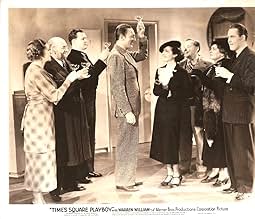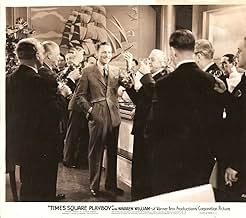A stock broker's best man thinks the bride-to-be and her family are just out for the groom's money, so he does everything he can to prevent the wedding.A stock broker's best man thinks the bride-to-be and her family are just out for the groom's money, so he does everything he can to prevent the wedding.A stock broker's best man thinks the bride-to-be and her family are just out for the groom's money, so he does everything he can to prevent the wedding.
- Director
- Writers
- Stars
George Beranger
- Jewelry Store Clerk
- (uncredited)
Ralph Brooks
- Nightclub Patron
- (uncredited)
James Conaty
- Board Member
- (uncredited)
Don Downen
- Billy
- (uncredited)
John Elliott
- Sam
- (uncredited)
Eddie Graham
- Club Bar Customer
- (uncredited)
Carol Hughes
- Phyllis
- (uncredited)
Mitchell Ingraham
- Calhoun's Servant
- (uncredited)
- Director
- Writers
- All cast & crew
- Production, box office & more at IMDbPro
Featured reviews
One critic wrote, "it's fifteen minutes for sure before there's an inkling of what the story's about." That's one of the elements that makes it so good: you can't figure it out. This is not formula, but a tightly written play from George M Cohan. The second scene has a clichéd conversation between two characters. Later, one player takes the chat and puts a totally negative spin on it. The other actors argue that everything he interpreted is opposite from the truth. This is like a good courtroom drama. Other elements that make it great are Gene Lockhart and Bart MacLane at their best. The comedy is funny, especially when Lockhart gets apoplectic. It has slapstick, and proves that a wrestling move taught in act 1 must be used in act 3. True screwball, the best of all movie genres.
Pitched about ten decibels too high as though that makes the lame material funnier, the shouted dialog from Vic (William) and Ban (Lockhart) had me reaching for earmuffs. That might be okay if there were enough comedy to relieve the aural assault. But there isn't. Then too the storyline is flat and repetitive, about a mix-up between Vic's best man Ban and his fiancee's family, putting them at loggerheads. Meanwhile, the mix-ups bounce around like pinballs with about that much credibility. The most interesting part is the mock wrestling between "butler" Casey (MacLane) and his uptown employer Vic. Seems Casey is also Vic's physical trainer, a good amusing touch. There's also a promising subplot of big city vs. small town that unfortunately goes under-developed. Fortunately, the movie does have the great Warren William—the main reason I tuned in. Plus, he gets a chance to play outside his usual high-class schemer roles. I'm just sorry that overall the material and direction add up to an over-the-top disappointment.
This was the second filming of George M. Cohan's 1926 comedy about Warren William inviting his long-time friend, Gene Lockhart, to be best man at his wedding. Lockhart perceives that his fiancée, June Travis, and her family are gold diggers taking William for a ride, so he proceeds to wreck the relationship. Gene Lockhart has the best role, the best lines and the best performance. The only trouble with the movie is that it takes too long for William to set Lockhart straight. It would have been a better movie if William tried more forcefully at first but failed because Lockhart constantly interrupted him. As it is, there are enough pauses to make me think he didn't try just to extend the running time, which is a short 62 minutes anyway. It's clearly director William McGann's fault. But Lockhart is great as the supreme conclusion jumper and buttinsky, and this movie is still much better than the 1940 remake. I'd love to see the first 1928 version, also a talkie.
You might notice a credit error: Craig Reynolds is credited onscreen with the character name of Joe Reynolds, but he is called Joe Roberts throughout the movie.
You might notice a credit error: Craig Reynolds is credited onscreen with the character name of Joe Reynolds, but he is called Joe Roberts throughout the movie.
I definitely agree that this picture was 'stolen" by Gene Lockhart. He is delightful as he storms around, ranting about how his buddy is about to be "taken" by the family of the woman he is going to marry. Lockhart's real life wife Kathleen plays his wife in the movie. Her acid tongued rejoinders to him are delightful. It was also a treat for me to see Barton MacLane in a role where he is not some kind of bad guy. It's a real change of pace for him and he handles it very well. There's not much plot to this film, no criminals or thugs, but it is a nice, simple story of two life long friends and how they resolve a major misunderstanding. At 62 minutes it moves quickly and the viewer won't become bored.
I imagine Warner Bros. thought titling the film "Times Square Playboy" with Warren William starring would bring in more business than the title of the play upon which the movie is based - the more aptly named "The Home Towners", and they were probably right.
You can tell that after the production code era began in 1934 Warner Bros. just didn't know what to do with Warren William. William plays a 40ish man of means, Vic Arnold, who invites an old hometown friend (Gene Lockhart as Ben Bancroft) to be best man at his wedding in New York City, which is where Vic has been living all of these years. This is more a story of city cousin/country cousin than anything else. When Ben first arrives in New York from his rural hometown he finds the whole thing exciting, but after he meets Vic's fiancée's brother, Ben gets the idea that Vic's fiancée is just marrying his friend for his money and the financial support she can get can for her entire family rather than for love. I found this part of the film hard to follow because I really didn't see anything in the action or speech of the brother-in-law-to-be that would suggest he or anyone else was gold digging.
The rest of the film is just about all of the trouble caused by some misspoken insulting words from Ben to Vic's fiancée's family, and quite frankly it seemed like much ado about nothing. Lockhart was good in this rare leading role, but the character was just too obnoxious and true to his nickname of "pig-head" to like, and Warren William was just too easy going about the whole thing. That's the problem with these first production code era high society comedies - the censors took away all of their ammo, rendering them unable to develop some interesting misunderstandings with punch, and it would be two or three years more before the movies could adapt to this very un-brave new world.
I like Warren William a great deal, and I highly suggest the movies he made during 1934 and before for a taste of him at his precode best, and I also recommend the films he did as the Lone Wolf at Columbia in the late 30's and early 40's, by which time Hollywood figured out how to convey the sophisticated sassiness of Warren William without crossing the censors. This one just disappoints on all elements of substance. I give it five stars for having great style but a story that misses the bullseye completely and wastes Warren William's talent.
One touch that I really liked: Barton MacLane, usually playing a bad guy, as Vic's not so gentle gentleman's gentleman.
You can tell that after the production code era began in 1934 Warner Bros. just didn't know what to do with Warren William. William plays a 40ish man of means, Vic Arnold, who invites an old hometown friend (Gene Lockhart as Ben Bancroft) to be best man at his wedding in New York City, which is where Vic has been living all of these years. This is more a story of city cousin/country cousin than anything else. When Ben first arrives in New York from his rural hometown he finds the whole thing exciting, but after he meets Vic's fiancée's brother, Ben gets the idea that Vic's fiancée is just marrying his friend for his money and the financial support she can get can for her entire family rather than for love. I found this part of the film hard to follow because I really didn't see anything in the action or speech of the brother-in-law-to-be that would suggest he or anyone else was gold digging.
The rest of the film is just about all of the trouble caused by some misspoken insulting words from Ben to Vic's fiancée's family, and quite frankly it seemed like much ado about nothing. Lockhart was good in this rare leading role, but the character was just too obnoxious and true to his nickname of "pig-head" to like, and Warren William was just too easy going about the whole thing. That's the problem with these first production code era high society comedies - the censors took away all of their ammo, rendering them unable to develop some interesting misunderstandings with punch, and it would be two or three years more before the movies could adapt to this very un-brave new world.
I like Warren William a great deal, and I highly suggest the movies he made during 1934 and before for a taste of him at his precode best, and I also recommend the films he did as the Lone Wolf at Columbia in the late 30's and early 40's, by which time Hollywood figured out how to convey the sophisticated sassiness of Warren William without crossing the censors. This one just disappoints on all elements of substance. I give it five stars for having great style but a story that misses the bullseye completely and wastes Warren William's talent.
One touch that I really liked: Barton MacLane, usually playing a bad guy, as Vic's not so gentle gentleman's gentleman.
Did you know
- TriviaThe Times Square Playboy (1936) screenplay was based on the Broadway production of "The Home Towners" by stage legend George M. Cohan, which opened at the Hudson Theater on August 23, 1926 and ran for 64 performances.
Working titles were Broadway Playboy, The Gentleman from Big Bend and His Best Man. It was produced and distributed by Warner Bros. The film's art direction was by Esdras Hartley, and uncredited costume design by Orry-Kelly.
- GoofsCasey (Vic's butler/judo instructor) when the entire group is enjoying a toast with champagne, is the first to throw his glass at a door and have it shatter in celebration. When it hits, the floor beneath the door is already littered with broken glass.
- Quotes
P.H. Bancroft: Here's mud in your eye!
- ConnectionsFeatured in MsMojo: Top 10 Funniest Bloopers from Classic Hollywood Movies (2023)
- SoundtracksLooking for Trouble
(uncredited)
Music by M.K. Jerome
Lyrics by Joan Jasmyn
[Beth aka Fay Melody (June Travis) sings the song in her nightclub act]
Details
- Runtime1 hour 2 minutes
- Color
- Sound mix
- Aspect ratio
- 1.37 : 1
Contribute to this page
Suggest an edit or add missing content
































